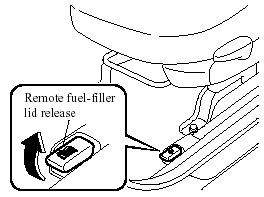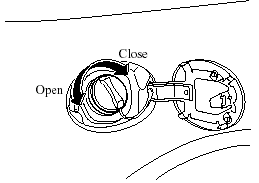Fuel-Filler Lid and Cap
WARNING.
When removing the fuel cap, loosen the
cap slightly and wait for any hissing to
stop. Then remove it:
Fuel spray is dangerous. Fuel can
burn skin and eyes and cause illness
if ingested. Fuel spray is released
when there is pressure in the fuel
tank and the fuel cap is removed too
quickly.
Before refueling, stop the engine, and
always keep sparks and flames away
from the filler neck:
Fuel vapor is dangerous. It could be
ignited by sparks or flames causing
serious burns and injuries.
Additionally, use of the incorrect fuel filler cap or not using a fuel filler cap may result in fuel leak, which could result in serious burns or death in an accident.
CAUTION.
Always use only a genuine Mazda fuel cap or an approved equivalent, available at an Authorized Mazda Dealer. The wrong cap can result in a serious malfunction of the fuel and emission control systems. It may also cause the check engine light in the instrument cluster to illuminate.
Fuel-Filler Lid
To open, pull up the remote fuel-filler lid release.

NOTE.
The fuel-filler lid cannot be opened when the right-side sliding door is open. Close the sliding door to open the fuel-filler lid.
Fuel-Filler Cap
To remove the fuel-filler cap, turn it counterclockwise.
To close the fuel-filler cap, turn it clockwise until two or more click sounds are heard.

CAUTION.
Make sure the fuel-filler cap is tightened securely. The check engine light may illuminate when the cap is not tightened securely. If the light remains on (even after you have tightened the cap securely, driven, and restarted the engine several times), it may indicate a different problem. Contact an Authorized Mazda Dealer as soon as possible.
See also:
Vehicle Overview
Mazda's larger, more powerful replacements for the departed Protege sedan and
Protege5 hatchback went on sale in the 2004 model year. Built on the same
platform as the Volvo S40, the compact, fron ...
Ashtray
CAUTION:
Do not use the ashtray for trash. You
might start a fire.
To use, open the cover.
To remove, open the cover and pull up the
ashtray. ...
Keyless Entry System
This system remotely locks and unlocks
the doors and opens the trunk lid, and
opens the power windows and the
moonroof.
It can also help you signal for attention.
Operating the theft-deterrent sy ...


